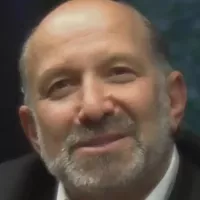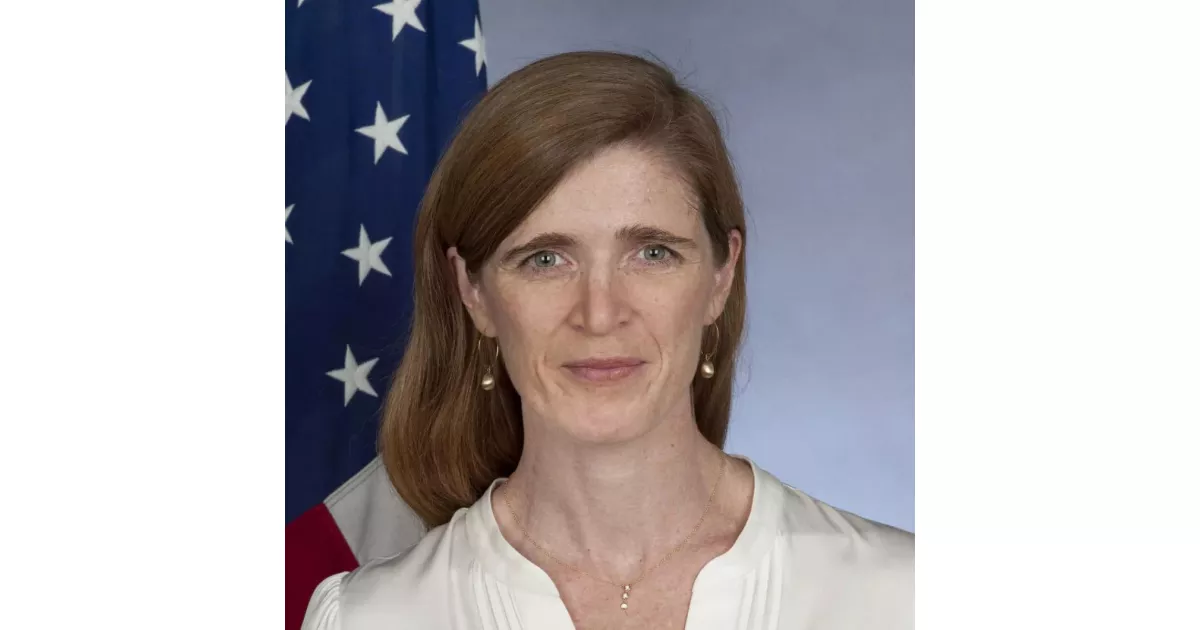Samantha Power is an American journalist, diplomat, and government official. She currently serves as the Administrator of the United States Agency for International Development (USAID) and was the 28th U.S. Ambassador to the United Nations from 2013 to 2017. Power is a member of the Democratic Party.
1945: Formation of the United Nations
Power's statement referenced the year 1945, marking the establishment of the United Nations after World War II.
1967: Israeli Settlement Activity
Power highlighted how Israeli settlement activity in territories occupied since 1967 has negative implications for Israel's security, a two-state solution, and regional peace.
September 21, 1970: Birth of Samantha Power
Samantha Jane Power was born on September 21, 1970. She would go on to become an influential American journalist, diplomat, and government official, serving in key roles such as the 28th United States Ambassador to the United Nations from 2013 to 2017.
1979: Emigrated to the United States
In 1979, Samantha Power emigrated to Pittsburgh, Pennsylvania, from Ireland with her mother. She was raised in the Dublin district of Castleknock and attended Mount Anville Montessori Junior School before moving to the United States.
1993: Work at Carnegie Endowment and War Correspondence
After graduating from Yale, Samantha Power worked as a researcher at the Carnegie Endowment for International Peace and later as a war correspondent from 1993 to 1996, covering the Yugoslav Wars for various major publications.
1993: Became a U.S. Citizen
In 1993, at the age of 23, Samantha Power became a U.S. citizen. This significant personal milestone came after she had attended Lakeside High School in Georgia and received her B.A. from Yale University.
1996: Covered the Yugoslav Wars
From 1993 to 1996, Samantha Power worked as a war correspondent, covering the Yugoslav Wars for U.S. News & World Report, The Boston Globe, The Economist, and The New Republic. This early career experience shaped her understanding of international conflict and human rights.
1998: Founding Executive Director of Carr Center
In 1998, Samantha Power became the Founding Executive Director of the Carr Center for Human Rights Policy at Harvard Kennedy School. This marked a significant step in her career in academic administration and human rights.
1998: Founding of Carr Center for Human Rights Policy
In 1998, Samantha Power founded the Carr Center for Human Rights Policy at Harvard Kennedy School, where she served as the Executive Director. This center became a significant institution for human rights research and policy development.
1999: Graduation from Harvard Law School
Samantha Power graduated from Harvard Law School in 1999, earning her J.D. This academic achievement was pivotal in her career, enabling her to blend legal expertise with her commitment to human rights and policy.
2001: UN World Conference against Racism
The 2001 UN World Conference against Racism, a precursor to the Durban Review Conference, faced criticism for becoming a platform for "Israel bashing."
2002: Interview with Harry Kreisler
In 2002, Samantha Power participated in an interview with Harry Kreisler, during which she made statements that some interpreted as being pro-Palestinian and anti-Israeli, leading to further clarifications on her positions.
2002: End of Tenure as Executive Director
Samantha Power served as the Founding Executive Director of the Carr Center for Human Rights Policy at Harvard Kennedy School until 2002, shaping the center's direction and contributions to human rights policy.
2003: Article in The New Republic
In 2003, Samantha Power wrote an article in "The New Republic" that drew criticism from figures like John R. Bolton, who claimed it compared the United States to Nazi Germany.
2003: Won Pulitzer Prize for 'A Problem from Hell'
In 2003, Samantha Power's book 'A Problem from Hell: America and the Age of Genocide' won the Pulitzer Prize for General Nonfiction. The book, originating from a paper she wrote in law school, significantly influenced the doctrine of 'responsibility to protect'.
2004: Named in Time's 100 Most Influential People
In 2004, Samantha Power was named one of Time magazine's 100 most influential people in the world. This recognition highlighted her impact on international affairs and human rights advocacy.
2005: Foreign Policy Fellow for Senator Barack Obama
From 2005 to 2006, Samantha Power worked in the office of U.S. Senator Barack Obama as a foreign policy fellow, where she played a crucial role in directing Obama's interest in the Darfur conflict.
August 2007: Authored Memo on Obama's Foreign Policy
In August 2007, Samantha Power wrote a memo titled 'Conventional Washington versus the Change We Need', which provided an early comprehensive statement of Barack Obama's approach to foreign policy. In the memo, she advocated for a new era of engaged American diplomacy.
2007: Began Writing Column for Time Magazine
In fall 2007, Samantha Power began writing a regular column for Time magazine, where she shared her insights on international relations, human rights, and U.S. foreign policy.
March 6, 2008: Interview with The Scotsman
On March 6, 2008, Samantha Power gave an interview to the Scottish newspaper, "The Scotsman."
March 2008: International Book Tour for 'Chasing the Flame'
In March 2008, Samantha Power embarked on an international tour to promote her book 'Chasing the Flame'. Many of her interviews during this tour also touched on her involvement in Barack Obama's presidential campaign and their views on foreign policy.
March 2008: Resignation from Obama's Presidential Campaign
In March 2008, Samantha Power resigned from her role as a senior adviser to Senator Barack Obama during the presidential primaries. Prior to this, she had been a key foreign policy adviser to Obama.
March 2008: Appearance on BBC's HARDtalk
On March 6, 2008, Samantha Power appeared on BBC's HARDtalk, where she discussed Barack Obama's pledge to withdraw U.S. combat brigades from Iraq within 16 months. She highlighted the importance of adapting plans based on the situation at the time.
March 17, 2008: Appearance on The Colbert Report
On March 17, 2008, following her resignation, Samantha Power appeared on "The Colbert Report," where she clarified her stance on Hillary Clinton, stating that she didn't view Clinton as a "monster."
July 4, 2008: Samantha Power Marries Cass Sunstein
On July 4, 2008, Samantha Power married law professor Cass Sunstein, whom she met during their time working on the Obama campaign. Their wedding ceremony took place at the Church of Mary Immaculate in Lohar, Waterville, County Kerry, Ireland.
August 2008: Interview with Shmuel Rosner
In August 2008, Samantha Power provided clarification regarding her stance on the Israeli-Palestinian conflict during an interview with Haaretz correspondent Shmuel Rosner.
November 2008: Joined Obama State Department Transition Team
In late November 2008, Samantha Power joined the Obama State Department transition team, marking a pivotal moment in her career as she prepared to take on significant roles in the administration.
2008: Joined Obama's State Department Transition Team
After the 2008 presidential election, Samantha Power joined President-elect Barack Obama's State Department transition team.
2008: Publication of 'Chasing the Flame'
In 2008, Samantha Power published 'Chasing the Flame: Sergio Vieira de Mello and the Fight to Save the World', a book that adds to her bibliography of impactful works on human rights and international diplomacy.
2008: Senior Foreign Policy Adviser to Obama's Campaign
In 2008, Samantha Power served as a senior foreign policy adviser to Barack Obama's presidential campaign. She resigned during the primaries but had a significant influence on the campaign's foreign policy direction.
January 2009: Obama's Presidential Inauguration
In January 2009, Barack Obama was inaugurated as President of the United States. Samantha Power, who had been a key foreign policy adviser during his campaign, joined the administration in a significant role shortly after his inauguration.
January 2009: Appointed to the National Security Council
In January 2009, President Obama appointed Samantha Power to the National Security Council as a Special Assistant to the President and Senior Director for Multilateral Affairs and Human Rights.
January 2009: Appointed Special Assistant to the President
In January 2009, Samantha Power was appointed as Special Assistant to the President and Senior Director for Multilateral Affairs and Human Rights on the National Security Council, a role she held until February 2013.
February 2009: Announcement of End of Combat Operations in Iraq
In February 2009, President Obama announced that the U.S. would end combat operations in Iraq by August 31, 2010, and withdraw all U.S. soldiers by the end of 2011. This announcement aligned with the responsible withdrawal plan discussed by Samantha Power in her 2008 interviews.
April 24, 2009: Samantha Power Welcomes First Child
On April 24, 2009, Samantha Power gave birth to her first child, a son.
2009: Appointed to National Security Council
In 2009, President Obama appointed Samantha Power to the National Security Council, where she served as Special Assistant to the President and Senior Director for Multilateral Affairs and Human Rights.
2009: Durban Review Conference
In 2009, Samantha Power, in her capacity at the National Security Council, kept the U.S. out of the Durban Review Conference.
2009: End of Tenure as Anna Lindh Professor
Samantha Power served as the first Anna Lindh Professor of Practice of Global Leadership and Public Policy at Harvard Kennedy School until 2009, contributing significantly to the field of human rights and policy.
August 31, 2010: End of U.S. Combat Operations in Iraq
On August 31, 2010, President Obama announced the end of U.S. combat operations in Iraq. Samantha Power had previously discussed Obama's plan for Iraq during her appearance on BBC's HARDtalk in March 2008, emphasizing a responsible withdrawal of U.S. forces.
2011: Co-edited 'The Unquiet American'
In 2011, Samantha Power co-edited 'The Unquiet American: Richard Holbrook in the World' with Derek Chollet, contributing to the literature on international relations and American diplomacy.
2011: End of U.S. Mission in Iraq
The U.S. formally ended its mission in Iraq on December 15, 2011. This marked the completion of the withdrawal plan that had been a significant part of Barack Obama's policy, which Samantha Power had discussed and supported.
April 2012: Chair of Atrocities Prevention Board
In April 2012, President Obama appointed Samantha Power to chair the newly formed Atrocities Prevention Board, highlighting her long-standing advocacy against atrocities and her influence in shaping U.S. policy on humanitarian interventions.
June 1, 2012: Samantha Power Welcomes Second Child
On June 1, 2012, Samantha Power gave birth to her second child, a daughter.
February 2013: Left the National Security Council
Samantha Power left her position at the National Security Council in February 2013.
February 2013: End of Role as Special Assistant
Samantha Power's tenure as Special Assistant to the President and Senior Director for Multilateral Affairs and Human Rights on the National Security Council ended in February 2013. During her time in this role, she made significant contributions to multilateral affairs and human rights.
June 5, 2013: Nominated as U.S. Ambassador to the United Nations
On June 5, 2013, President Barack Obama nominated Samantha Power as the U.S. Ambassador to the United Nations.
August 1, 2013: Confirmed as UN Ambassador
On August 1, 2013, the U.S. Senate confirmed Samantha Power as the UN Ambassador with an 87 to 10 vote.
August 21, 2013: Syrian Government's Use of Chemical Weapons
The U.S. Government released an assessment on August 21, 2013, concluding that the Syrian government had used chemical weapons.
September 2013: Criticism of Assad Regime and UN Inaction
During a September 2013 news conference, Samantha Power condemned the Assad regime's actions in Syria and criticized the United Nations' inability to effectively address the atrocities and hold those responsible accountable.
2013: Appointed U.S. Ambassador to the United Nations
In 2013, Samantha Power was appointed as the 28th United States Ambassador to the United Nations, a role she held until 2017. During her tenure, she focused on issues such as United Nations reform, women's rights, LGBT rights, and human rights.
July 2014: LGBT Rights Address
At a Hunter College forum commemorating the 45th anniversary of the Stonewall riots in July 2014, Samantha Power addressed LGBT rights, emphasizing the ongoing struggle for equality globally.
July 2014: Support for Israel's Right to Self-Defense
In July 2014, during the 2014 Israel-Gaza conflict, Samantha Power expressed her support for Israel's right to defend itself.
2014: Subject of Documentary 'Watchers of the Sky'
In 2014, Samantha Power was featured in the documentary 'Watchers of the Sky', which highlighted her contributions to genocide prevention and her efforts to raise awareness about atrocities worldwide.
March 2015: Samantha Power Raises Concerns over European Defense Cuts
In March 2015, Samantha Power expressed concerns about planned defense cuts by European countries, particularly Britain, calling them "very concerning" in light of global challenges such as the Ebola crisis and the threat from ISIL.
June 2015: Samantha Power Addresses US House Committee on Iran Nuclear Negotiations
In June 2015, during negotiations with Iran regarding their nuclear program, Samantha Power addressed the US House Foreign Affairs Committee. She stated that the US would retain the right to reinstate sanctions against Iran without requiring unanimous support from the UN Security Council, though she refrained from providing specifics until a deal was finalized.
2015: Samantha Power Awarded Barnard Medal of Distinction
Barnard College recognized Samantha Power's contributions with their highest honor, the Barnard Medal of Distinction, in 2015. The award acknowledged her impactful book, "A Problem from Hell," her dedication to denouncing genocide, and her unwavering belief in preventing future atrocities.
2015: Samantha Power's Advocacy for Armenian Genocide Recognition
In 2015, Samantha Power faced criticism for the Obama administration's failure to recognize the Armenian genocide. Power, a long-time advocate for its recognition, detailed her efforts to convince President Obama in her memoir, describing her disappointment and the day, which coincided with the birth of her son, as an example of loneliness she experienced at the White House.
2015: Awarded Barnard Medal of Distinction
In 2015, Samantha Power was awarded the Barnard Medal of Distinction, recognizing her significant contributions to human rights and her impactful career in public service.
June 8, 2016: Samantha Power Receives the Henry A. Kissinger Prize
Samantha Power was awarded the Henry A. Kissinger Prize on June 8, 2016, at the American Academy in Berlin, recognizing her work as the United States Permanent Representative to the United Nations.
December 2016: Support for Obama's Veto Decision
Samantha Power voiced her support for the Obama administration's decision not to veto a resolution condemning Israeli settlements in occupied territories in December 2016.
2016: Samantha Power Condemns Russia's Actions in Syria
In 2016, in response to the situation in Syria, Samantha Power strongly criticized Russia's involvement, stating that their actions constituted "barbarism" rather than counter-terrorism. She accused Russia and Assad of prioritizing war over peace and targeting humanitarian aid convoys and medical facilities. Her statement came after a ceasefire agreement collapsed following the bombing of an aid convoy.
2016: Received Henry A. Kissinger Prize
Samantha Power received the Henry A. Kissinger Prize in 2016, further acknowledging her influence and achievements in global diplomacy and human rights advocacy. That same year, she was listed as the 41st-most powerful woman in the world by Forbes.
April 2017: Samantha Power Joins Harvard Law School and Harvard Kennedy School Faculty
In April 2017, Samantha Power took on a joint faculty appointment at Harvard Law School (HLS) and Harvard Kennedy School. At the Kennedy School, she became affiliated with the Carr Center and the Belfer Center. She holds the position of senior member, board member, and director of the International Peace and Security Project. Additionally, she co-teaches a course with her husband, Cass Sunstein, titled "Making Change When Change is Hard."
May 31, 2017: Samantha Power Subpoenaed by House Intelligence Committee
On May 31, 2017, Samantha Power's testimony and related records were subpoenaed by the House Intelligence Committee. This action was part of the committee's investigation into the unmasking of US citizens whose communications she had obtained through intelligence surveillance.
November 2017: Samantha Power Receives the Ulysses Medal
In November 2017, University College Dublin honored Samantha Power with the Ulysses Medal.
2017: Samantha Power Apologizes for Obama Administration's Stance on Armenian Genocide
In 2017, Samantha Power issued an apology on Twitter for the Obama administration's failure to recognize the Armenian genocide.
2017: End of Tenure as U.N. Ambassador
Samantha Power's tenure as the 28th United States Ambassador to the United Nations ended in 2017. During her service, she was recognized for her efforts in addressing issues like human trafficking, refugees, and democracy.
October 2018: Samantha Power Criticizes Saudi Arabia's Explanation of Jamal Khashoggi's Death
In October 2018, following Saudi Arabia's explanation regarding the death of journalist Jamal Khashoggi, Samantha Power took to Twitter to express her skepticism. She criticized their shifting narrative, from initial denials to claims of a "rogue operation," asserting that it lacked credibility.
2019: Published 'The Education of an Idealist'
In 2019, Samantha Power published her memoir 'The Education of an Idealist', offering insights into her career, personal life, and the challenges and triumphs she experienced along the way.
2019: Samantha Power Receives the Daniel Patrick Moynihan Prize and Delivers Commencement Address at Indiana University
Samantha Power was honored with the 2019 Daniel Patrick Moynihan Prize by the American Academy of Political and Social Science. In the same year, she delivered the commencement address at Indiana University, where she also received an honorary doctorate.
2020: Ceasefire Agreement in Nagorno-Karabakh
A ceasefire agreement was reached in 2020 in Nagorno-Karabakh.
January 2021: Nominated to Head USAID
In January 2021, President Joe Biden nominated Samantha Power to head the United States Agency for International Development (USAID), recognizing her extensive experience in diplomacy and international affairs.
January 2021: Samantha Power Nominated as USAID Administrator
President-elect Joe Biden nominated Samantha Power to lead the United States Agency for International Development (USAID) in January 2021.
April 28, 2021: Confirmed as USAID Administrator
On April 28, 2021, Samantha Power was confirmed by the US Senate as the Administrator of the United States Agency for International Development (USAID) by a vote of 68–26. This role marked a new chapter in her career in public service and international development.
September 2023: Samantha Power Calls for Peace in Nagorno-Karabakh
Amidst Azerbaijan's offensive against the self-declared Republic of Artsakh in September 2023, Samantha Power urged Azerbaijan to uphold the ceasefire agreement established in 2020 and to take measures to ensure the safety and rights of civilians in Nagorno-Karabakh.
Mentioned in this timeline

Barack Obama the th U S President - was the...
Ukraine is a country in Eastern Europe the second-largest on...

Hillary Diane Rodham Clinton is a prominent American politician lawyer...

Joe Biden is an American politician who served as the...

The White House located at Pennsylvania Avenue NW in Washington...
Saudi Arabia officially the Kingdom of Saudi Arabia KSA is...
Trending

56 minutes ago Kris Dunn Shines: Steals the Show with Impressive Defensive Performance for Clippers

57 minutes ago Queta's Hilarious Clip Evokes Mazzulla Memories: A Lighthearted NBA Moment

57 minutes ago Howard Lutnick faces potential subpoena in Epstein investigation, House Republicans consider deposition.

57 minutes ago Nakashima at Acapulco Open 2026: Match Predictions and Results Analysis.

57 minutes ago Donte DiVincenzo's Underrated Impact on Timberwolves: A Deep Dive into His Contributions

58 minutes ago Luka Don?i?'s Botched Play and Sam Mitchell's Criticism Doom Lakers Against Magic
Popular

Jesse Jackson is an American civil rights activist politician and...

Susan Rice is an American diplomat and public official prominent...

Barack Obama the th U S President - was the...

XXXTentacion born Jahseh Dwayne Ricardo Onfroy was a controversial yet...

Michael Joseph Jackson the King of Pop was a highly...

Kashyap Pramod Patel is an American lawyer who became the...
